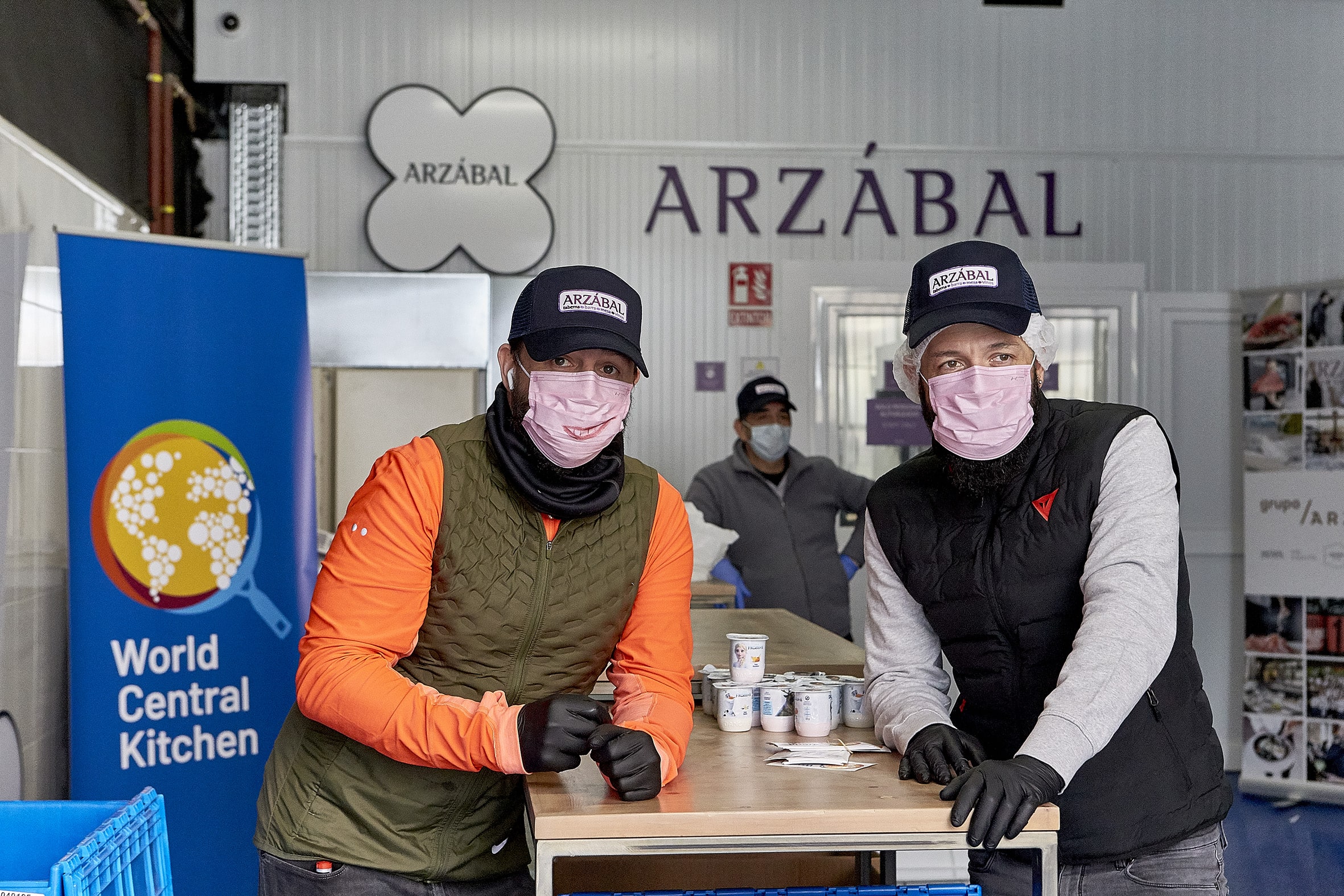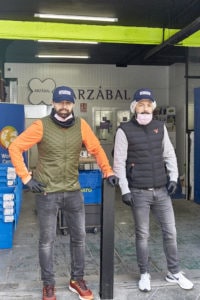
Pioneering chef José Andrés and his non-profit organisation have helped people in crisis all over the world, from Haiti to Albania; Mozambique to the US. Now World Central Kitchen (WCK) has set up facilities to feed people across Spain with the help of local chefs and solid partnerships.
While Covid-19 has already caused untold damage globally and claimed thousands of lives, many heartening stories of solidarity, generosity and humanity have been shared in the past month.
As now seems customary whenever there is a crisis, WCK has taken centre stage in its effort to help. Over the last two weeks the humanitarian organisation, led by local experts, has set up a series of community kitchens in Spain – among Europe’s hardest hit countries by this crisis. To date, 500 volunteers have signed up with WCK in this effort across Spain. They are working alongside catering companies and some of the country’s most popular chefs.
help. Over the last two weeks the humanitarian organisation, led by local experts, has set up a series of community kitchens in Spain – among Europe’s hardest hit countries by this crisis. To date, 500 volunteers have signed up with WCK in this effort across Spain. They are working alongside catering companies and some of the country’s most popular chefs.
In Madrid, Pepa Muñoz (right) from El Qüenco de Pepa has taken charge of the kitchens of NH Eurobuilding hotel while Diego Guerrero of the two-Michelin starred Dstage has joined forces with catering firm Medems. In Seville, meanwhile, more than 50 chefs have got together and this week will produce 5,000 meals for those who need it.
At the time of writing, Spain has seen over 141,000 infections and more than 14,000 deaths due to Covid-19. The country has been in strict lockdown and people confined to their homes since the middle of March.
Since its launch in 2010, WCK has served over 15 million meals in zones grappling with natural disasters and other challenging situations – just last year Andrés and his team set up to provide food to locked out federal workers in the US.
#ChefsforSpain
In Spain, restaurants that have had to close due to the virus, have been converted to community kitchens launched under the banner #ChefsforSpain. The first to get involved was Arzábal, a Madrid-based restaurant group famous for its focus on high quality Spanish produce.
 Co-founders Álvaro Castellanos and Iván Morales (left) have opened their central kitchen to produce daily meals for vulnerable families and the elderly.
Co-founders Álvaro Castellanos and Iván Morales (left) have opened their central kitchen to produce daily meals for vulnerable families and the elderly.
Shortly after Spain entered into lockdown, Morales began thinking about how he could make a difference. “I knew that I had to cook, but I didn’t want to be in charge of deciding who would receive our food – that’s a huge responsibility – and of course I wasn’t able to organise the logistics that are very complicated,” he says.
He called Patricia Mateo, CEO of communications agency Mateo & Co, who works with Arzábal. Coincidentally the agency also works with Jose Andrés’s Think Food Group in Spain. “The logical step was to call José Andrés to propose a Spanish base for WCK,” she says. She was quickly connected with Javier Garcia, WCK general secretary who advised on how to get started.
Garcia says the organisation was compelled to act. “We see it as our responsibility to help Spain as one of the European countries hardest hit by Covid-19 and with so many people who are struggling to access food,” he says. “With this initiative we aim to help them and to cover a key area of need by serving thousands of portions of food in Madrid and beyond.”
Before putting the developments in motion in Spain, WCK had already responded to people in crisis caused by Covid-19 in 20 other cities across the world.
At Arzábal, the team started discussing plans on 25 March and two days later the kitchen was up and running. It goes without saying these are busy days for Morales. “We really want to do this and we are aware of the responsibility – we know what we are doing is important and that helps you forget that you are tired,” he says. “We are used to the physical demands of the kitchen, but this is more mental – you have the constant pressures of knowing that there are people who are not eating during this time. It makes you think a lot.”
Business as usual in the kitchen
After some initial conversations with the WCK team in the US, Mateo got things underway very quickly. While the WCK team advised on practical considerations, the local government in Madrid provided information about who would be likely beneficiaries of the food.
Food wholesaler Makro stepped in to provide the produce and ingredients needed for the effort. “When it comes to supplying produce, Makro is the reference point for chefs and we work with restaurants all over the country,” explains marketing director Chema León. “Unfortunately, at the moment those restaurants are not able to operate and we have become the official supplier to World Central Kitchen in Spain.”
The food lea ving the Arzábal kitchen is sent to families that are in receipt of free meals as well as the elderly. It is home cooking – roast chicken, salads, omelettes. “It’s tasty and simple cooking that we all cook for our families at home,” says Morales.
ving the Arzábal kitchen is sent to families that are in receipt of free meals as well as the elderly. It is home cooking – roast chicken, salads, omelettes. “It’s tasty and simple cooking that we all cook for our families at home,” says Morales.
The kitchen, staffed by the Arzábal team who have all volunteered during this time, started out producing 1,500 portions a day and slowly increased quantities.
There are obvious differences in the way the team serves up the food. Packing it all in individual portions is more onerous than simply plating up. “It takes a lot of time and many hands are required to do this work,” he explains.
But – beyond the unusual circumstances – on a practical level, little is different for the kitchen team in Arzábal. “It’s not that different from how we would normally behave in the kitchen – we usually wear hair nets, aprons and gloves. The only thing is that we don’t usually wear face masks,” explains Morales.
Unity and solidarity
At this point there are eight kitchens operating with more underway. So far WCK has appeared in cities including Madrid, Barcelona, Valencia and Sevilla with local chefs manning kitchens to cook for those in need during this challenging time. Many more cities are set to follow in the next weeks.
“We are very happy to see how this gastronomic solidarity movement in Spain is growing and in just more than a week there are more than seven kitchens with dozens of chefs from different restaurants taking part. We are already analysing the situation and the needs in the different Spanish geographical territories to start working in places where help is most urgent,” says Garcia. “In Madrid, we have received such a positive response that, for now, we have the needs covered for the upcoming weeks. We appreciate enormously the collaboration and predisposition of all the people who join the project and we continue to receive volunteers w ho want to support this initiative solidarity to join the different work teams that already are open.”
ho want to support this initiative solidarity to join the different work teams that already are open.”
They are stepping in to fill the void left by those places who would under normal circumstances feed people. “The kitchens that usually feed the families who live on the edge, the homeless people and the elderly, are all closed now because of the lockdown so these people don’t get the food,” explains Mateo.
It is an extraordinary operation, but then these are extraordinary times, as Morales says. He describes conversations he has had with his grandmother about living through similar circumstances during the Spanish Civil War. “This situation of not being able to leave home is unknown for most of us. “I think during times like these the responsibility of all of us increases. We have to do more. All of us.”
For León the current situation shows the Spanish gastronomy community at its best. “There is a real unity among chefs here and if José Andrés asks for something, they’ll react of course, but the truth is if any chef asks for help they show up,” he says. “The Spanish gastronomy world is very generous – there’s no problem sharing recipes and working together. That’s why we have the most important gastronomy congresses in the world.”
Spirit of urgency
Mateo has been impressed with the organisation of WCK. “They are so well organised, with all the protocols in place and moving at lightning speed,” she says. Makro’s León agrees: “It is a very professional organisation with a clear objective to help and they go at top speed to achieve this,” he says. “There’s zero bureaucracy involved, which is unusual in NGOs, they open entire kitchens from one day to the next.” It’s a reflection of the man leading them.
“José Andrés is the leader and the whole organisation shares his spirit of urgency, the spirit of saying yes to everything. Even when you think you can’t do something because of the challenges, he says yes, we can, we have to achieve this – and it gets done because the team is so focused,” says Mateo.

On their part Mateo & Co can draw on a large network of chefs, producers, suppliers and other foodservice professionals to connect the dots in Spain. There has been no shortage of chefs putting their hand up to volunteer their services. “We act as the base, identifying kitchens, providing chefs with induction kits to get started and taking care of all the practical elements such as packaging for the meals,” she explains.
Morales has little time to think about what might happen to his own business after this. It’s clear to him that the crisis will do much damage to hospitality. “it will take a long time for us to control this virus all over the world and it will hurt us a lot,” he says.
“But we’ll have to return with the same energy. I don’t know if I will have five restaurants or just one. All I know is that I will be cooking somewhere. We’ll start again and re-build.”
Reflecting on the past few weeks, he says volunteering the time and kitchen was instinctive. “If you see an old person falling over in the street, you’ll help them get back up – well, right now our country is falling over and we have to help it get back up, that’s all,” he says.
“We do what we know which is to cook. I know our work is important but I don’t want to make it more than it is right now.”
Tina Nielsen
